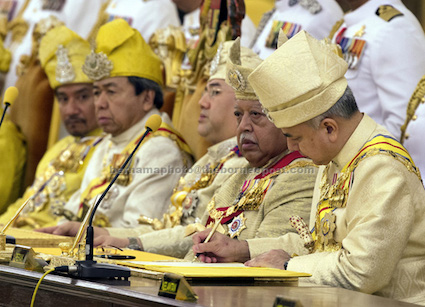As Malaysian politicians bicker, royals gain authority

(oltnews.com) – In a landmark election in 2018, Malaysians voted for change. Instead, they were upset. Dismayed at the increasing venality of the ruling Malaysian National Organization (UMNO), in power since the founding of the country, they opted instead for Pakatan Harapan (“Alliance of Hope”). Yet feuds within the new government led, a year ago, to its collapse and the emergence of a different coalition, including UM NO, which itself is perpetually on the verge of implosion.
Few are happy. Malaysians voted for Pakatan Harapan’s promises of good governance, strengthened democracy and an end to the politics of racial division. Yet the new prime minister, Muhyiddin Yassin, hunts down criticism and spreads favoritism much like dung – just like the good ex-UMNO the man he is. Ordinary people complain about the government’s handling of the coronavirus pandemic, which is both arbitrary and repressive.
Members of the country’s royal family, on the other hand, are in clubs. Nine of Malaysia’s 13 states have monarchs: seven sultans, one raja, and, in Negeri Sembilan, a life ruler elected by four big locals. The nine members of the Royal Family take turns serving five-year terms as Yang di-Pertuan Agong (“He who is made Lord”) – the constitutional head of the Malaysian federation.
In their states, the sultans wield considerable theoretical power: approving the chief minister, controlling the civil service and, in Johor, even commanding the palace guard. But at the federal level, recent kings have taken a back seat in politics. Their role in the appointment of prime ministers had been seen as essentially ceremonial.
The political unrest of the past year has pushed the tide Agong, the Sultan of Pahang, in prominence. Pakatan Harapan fell as 90-year-old Prime Minister Mahathir Mohamad and Anwar Ibrahim, who hoped to succeed him, argued. Dr Mahathir resigned his post as prime minister, apparently hoping to form a new government excluding Mr Anwar. But the Agong instead turned to Mr. Muhyiddin, who then took centuries to prove his majority in parliament. As William Case of the University of Nottingham in Malaysia says, the King became the kingmaker.
A few months later, Mr. Anwar looked for time with the Agong, claiming that he had “convincing” evidence that he could secure a parliamentary majority. For several days the monarch conveniently found himself incapacitated. Even Mr. Muhyiddin failed last year to persuade him to declare a state of emergency to fight the pandemic (and usefully prevent a vote of no confidence in the prime minister). It was not until January, on the second request, when Mr. Muhyiddin again appeared to lose his slim majority, the King acceded.
As political power becomes fragmented, royal influence will only grow, says James Chin of the University of Tasmania. The rulers are officially the custodians of both the culture of Malaysia’s Malay majority and their religion, Islam. They still have considerable constitutional powers, although Dr Mahathir, during a previous stint as prime minister, removed some of them.
There is a commercial dimension to their authority. The sultans influence the way the land is used in their states. They can also benefit from real estate developments accompanying federal projects, such as a high-speed train project. In Johor, the royal family thrived on deals with nearby Singapore and a China-backed mess, Forest City. Critics compare it to the stupendous but opaque possessions of the Thai royal family. Boss-client business networks cut across Malaysian royal circles, as they do through his politics. No aspiring prime minister would be stupid enough to ignore the interests of the sultans.
Not all Malaysians are happy. In Selangor, the heir to the Sultan is behind an unpopular attempt to transform a patch of protected forest for development. A daughter of agong is president of a company involved in a bitter land dispute with durian farmers.
Many want the royal family to stick with Instagram. There, one touchingly touts inelegant cooking efforts, another its sonic healing, and in the case of the Crown Prince of Johor (formerly involved in a nightclub brawl with another royal), a style rather naff life of polo and private plane. Someone who knows multiple royals calls them, overall, “a horrible bunch.” However, few will denounce them in public. As in Thailand, the royal family is protected by draconian laws, including that against sedition. While they have kept away from politics, why cross them? Go through them now, said a politician, and it could be a prison.

